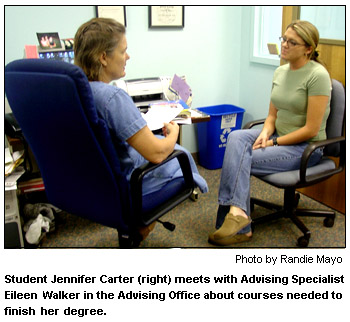NEWS |
|
Be sure to check out these other top stories:
Alumni resurrect BAS
|
Awareness needed for smooth transferBy Joshua Owens In a two-year college transfer is inevitable for those seeking four-year degrees. This transition can be either difficult or seamless depending on a few variables. Georgia Highlands is a member of the University System of Georgia (USG). It is an association of 35 Georgia-based higher learning institutions which enact and follow certain standards. Some prominent nearby members are Kennesaw State University, University of Georgia and Dalton State College.USG has a policy which governs transfers among its schools that says if a student completes the entire curriculum required in a certain area of the Academic Core (A-F) then the area as a whole may be transferred without question. If a student completes all the areas, then the associate degree requirements are satisfied and the degree as a whole may be transferred and the student considered a junior.There are exceptions to this policy. First and foremost, the chosen transfer school must be a member of USG. Second, the area/degree must be completely satisfied; classes in partially completed areas may or may not be accepted, depending on the individual school�s admission requirements. (A very beneficial source from which to extract this information is the Transfer Equivalency page most colleges maintain on their websites).Lastly, if the student changes his or her major some additional courses may need to be taken to fulfill requirements. For example, science majors cannot expect their science classes to transfer as math credits if they switch to a math major.
Walker said that when students run into transfer problems they have at their disposal employees hired for the purpose of easing transfer among USG schools. They are called �omsbudspersons� and their contact information can be found at USG�s website. Another problem has been unoffered classes delaying a student�s graduation.Dr. Virginia Carson, vice president for academic affairs, is aware of the past occurrence of the problem and is focusing her efforts on eliminating it. She asserts that across the board degree programs are able to be completed in a timely manner with a measure of planning. Carson suggests students be aware of the sequence in which classes are offered and also be flexible in registration since some in-demand classes fill up quickly and students may be required to take classes offered at alternate times.Most students are perfectly content with the USG transfer program. Andrew Dodd, an art major from Calhoun, said �My math might not transfer [alone], but I know it will transfer if I complete my associate degree.� Brad �Beau� Boddie, a science major from Cedartown, affirms the same sentiment. He said, �I�m most assuredly grateful. If I can�t be a Physician�s Assistant I can always do Public Health; Georgia State has a great program.� |
 Eileen Walker, advising specialist, points out that while four-year colleges do not offer a General Studies Major, it is still a good major for GHC students who haven�t yet firmly decided on a career. However, General Studies students need to consult carefully with their academic advisers to avoid or minimize any transfer problems.
Eileen Walker, advising specialist, points out that while four-year colleges do not offer a General Studies Major, it is still a good major for GHC students who haven�t yet firmly decided on a career. However, General Studies students need to consult carefully with their academic advisers to avoid or minimize any transfer problems.